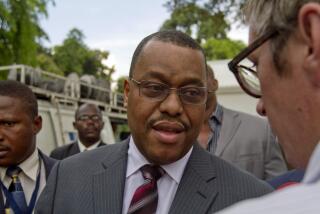New Ivory Coast president faces divided country; fighting continues in Abidjan
- Share via
Reporting from Johannesburg, South Africa — Ivory Coast’s new leader took charge of a divided country Tuesday, facing continued fighting in some neighborhoods of its commercial capital and a growing humanitarian crisis.
President Alassane Ouattara confronts the challenge of convincing skeptical opponents, including the 46% of the electorate who voted last fall for his rival, that he’s not a stooge of France or the West and is strong enough to unite his African nation’s disparate political forces.
Nearly 2 million people were displaced by weeks of fighting when his rival, former President Laurent Gbagbo, refused to step down. Medical aid and food were looted by militias during the violence.
The country’s former colonial power, France, pledged $589 million to help ease the humanitarian situation, pay the backlog of international debt, get the economy moving and reboot the public sector after months of paralysis.
Most of the fighting Tuesday was in the Cocody neighborhood of Abidjan, the commercial capital, a Gbagbo stronghold where the former president’s residence was located, and in the city’s Plateau district. Forces loyal to Ouattara were trying to defeat the remaining die-hard Gbagbo militants after relying heavily on French military assistance Monday and Tuesday to reach the former president’s home and capture him.
Five of Ivory Coast’s top military generals pledged their allegiance to Ouattara as president.
In a TV address Monday after Gbagbo’s capture, Ouattara called for restraint and promised that the former leader and his wife, Simone, would be treated with humanity and dignity as they face justice.
U.N. spokesman Farhan Haq said Tuesday that the couple and their son had been moved to a secret secure location outside Abidjan.
France has insisted its military, which intervened at the formal request of the United Nations to protect civilians, played no part in Gbagbo’s arrest. But many of his supporters may doubt the French version, having been bombarded by propaganda on state television for months accusing France and the U.N. of a conspiracy to take over the country. They form a strong undercurrent of opposition to Ouattara, who is perceived by many as being close to France and French President Nicolas Sarkozy.
Some analysts say the only way for Ouattara to neutralize doubts about his leadership is to jump-start the economy, restore security, and get the banks open for the first time in two months and the public sector back to work.
He has promised a South African-style truth and reconciliation commission to get to the bottom of postelection atrocities. Ouattara is under intense international pressure to ensure that any atrocities by his forces in western Ivory Coast in recent days are investigated and perpetrators face the courts.
The International Criminal Court has foreshadowed a possible investigation of crimes against humanity, and human rights organizations believe there is credible evidence against Gbagbo. Human Rights Watch investigations have implicated both sides of the conflict in such crimes.
The U.N. said Tuesday that 800 people had been confirmed killed in the crisis that followed November’s disputed election, but that the casualty figure was likely to be much higher. It confirmed 536 slain in the country’s troubled west as pro-Ouattara forces advanced through the area.
Ouattara, a U.S.-educated economist who lacks his rival’s common touch, faces an additional problem winning over nonsupporters: He spent many years outside his country working for the International Monetary Fund and the central bank serving West Africa’s monetary union.
For years he battled accusations from political opponents that he was an outsider. Gbagbo’s supporters and other political rivals dwelled on his time abroad and fostered doubts about whether he was even a citizen. In 1999 he was accused of forging identity documents showing both parents to be Ivorian and was twice prevented from running as president because of claims he was not a citizen.
More to Read
Sign up for Essential California
The most important California stories and recommendations in your inbox every morning.
You may occasionally receive promotional content from the Los Angeles Times.













